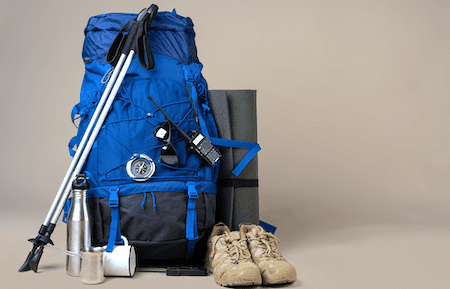It’s no secret that backpacking can be a workout all on its own. Between lugging around a heavy pack and summiting mountains, backpacking can be tough on the body.
The weight of your backpack can significantly impact your outdoor experience.
If it’s lightweight itself, it can improve the comfort of your trip, and if it’s heavy when empty, you can imagine how much it burdens the load.
Therefore, it’s crucial to find the right balance between comfort and weight.
So how do you find out how much does a backpack weigh empty?
Let’s explore the answer and everything that goes with it, including why it matters, how much it should weigh to best serve your purpose, and how to reduce the weight for a less-burdensome outing.
Why Does A Backpack’s Weight Matter?
Because the lighter your pack is, the easier it is to carry. If you’ve ever done it before, you know: Hiking with a heavy backpack is physically exhausting!
While there are some ways to lighten the load when hiking without a pack, there aren’t many options once you’re carrying one (besides taking things out).
Your shoulders will ache, your legs will feel heavy, and you’ll be wondering why you kept a heavy backpack in the first place!
Even if you do the math and figure out, you’ll only be carrying 10% of your weight, that’s still a lot of weight for your back to be carrying!
In other words, if you don’t choose your backpack carefully, it could really get in the way of what would otherwise be an enjoyable hike.
That’s why many people are willing to pay hundreds of dollars for ultralight backpacking gear.
But it’s also why even cheap backpacks have some sort of padded back. It makes carrying them a little more comfortable.
How Much Does A Backpack Weigh When Empty?
The weight of an empty backpack can vary based on the type of backpack you are using and the size and the materials used to make it. The average weight of an empty backpack designed for hiking is generally around 1-6 pounds.
The material thickness will have an impact on the total weight. A heavy-duty, high-quality backpack will weigh more than a cheap, flimsy one.
Typically, backpacks designed for hiking have a higher weight because they are built from more durable and long-lasting materials. The most common material is nylon or polyester, and these two can range from around 35gsm to 250gsm.
Nevertheless, there are quality ultra-light backpacks as well, meant for use on long-distance hikes and when camping lightly.
The lighter material they use and the fact that they don’t have fancy features make them exceptionally lightweight.
If we want to determine backpack weight by category, there are three main types of backpacks, each with a different weight when empty.
They are:
Rucksacks Or Backpacks For Multi-Day Hikes
The weight of a multi-day hike rucksack can vary greatly depending on the use. For instance, one designed for mountaineering will be heavier than one designed for backpacking the trails with a beach.
Generally speaking, a backpacking rucksack can range from 2 to 4 lbs. The majority of lightweight packs will be in the 3 to 3.5 lbs range.
The empty weight of rucksacks also varies significantly between brands, styles, and materials.
For example, Osprey Atmos 65 weighs as little as 3 lb 9 oz, whereas Kelty Trekker 65 weighs 5 lb 13 oz.
Daysacks Or Backpacks For Single Day Hikes
The larger the daysack, the heavier it is when empty. A standard-size daysack will usually be under 4.4 lbs.
For example, a 50-liter Osprey Kode 22 weighs 2.9 lbs, and an 80-liter Osprey Aether AG 85 weighs 3.9 lbs.
A smaller daysack will usually be under 2lbs. For example, a 25-liter Osprey Skarab 22 weighs 1lb 15 oz, and a 35-liter Osprey Viper 9 weighs 0.8kg 1lb 12oz.
Running Vests Or Backpacks For Running Trails
Smaller running vests usually weigh less than larger ones. A small CamelBak, a hydration pack, weighs 12 ounces (340.19 g), while a large one can weigh as much as 33 ounces (933.7 g).
The weight of a backpack or vest without a water reservoir is less than that with one.
For example, the weight of a CamelBak with a storage capacity is between 1 pound and 2 pounds, whereas the same CamelBak without the reservoir weighs about 14 ounces (397.87 g).
How Much Should A Backpack Weigh When Backpacking?
When considering how much your backpack should weigh, keep in mind that the answer will depend on several factors.
You’re going to want a backpack that is comfortable and large enough to fit all of your gear. That said, you also don’t want one too large or heavy.
In general, most experts agree that the average adult male or female should carry no more than 25% of his or her body weight when hiking or backpacking.
Meaning a 150-pound person shouldn’t have more than 38 pounds in their pack. If you’re smaller than this, then you’ll want something that weighs less than this amount.
There are some factors to consider when deciding how much weight you want inside of your backpack.
Your Pack’s Weight
Weight is the most crucial factor to consider when choosing a backpack. The more weight you carry, the more strain it puts on your body, especially your back and shoulders.
If you’re a serious hiker, you’ll probably want to spend some time weighing each item in your pack to make sure that you are not carrying anything extra—or any heavy items that you could replace with lighter ones.
For example, books are often bulkier than maps or electronic devices.
Your Trip Duration
How long you expect to be on the trail will significantly affect how much weight you want to carry on your back.
If you plan a short weekend trip, you may be willing to take on extra gear. On longer trips, however, every ounce counts.
For example, if you are participating in a thru-hike (a hike that takes place over several weeks or months), you’ll likely have fewer luxuries and more bare necessities.
Your Trip Terrain
Your trip terrain will impact the weight you want to carry in your backpack.
If you’re planning a trip that involves constant elevation changes, you will want to pack less weight than planning a relatively flat trip.
Going up and down hills and mountains requires much more physical exertion than traveling on flat ground.
Your Personal Preference
Your personal preference is essential to consider when deciding how much weight to pack inside your backpack.
What’s nice about this is that it means you can customize your package to fit your needs. Meaning you don’t have to follow any rules, but rather just do what works best for you.
Tips For Reducing Your Backpack’s Weight
Every ounce you cut from your pack is an ounce less you have to carry. Use these strategies to eliminate unnecessary weight.
Know Your Base Weight
Every time you go backpacking, it’s essential to calculate your base weight. It’s everything you’re carrying minus food and water, but that doesn’t mean it must be boring or restrictive.
Just make sure to take an honest inventory of every item in your bag because every little bit counts when it comes to saving pounds—even if they seem insignificant on their own.
Weigh Your Gear
Unless you’re camping light with only the essentials, your backpack is probably far too heavy. Take everything out of your pack and weigh it with a kitchen scale.
Then replace it with lighter-weight versions of your gear. It should be easy; don’t forget that you probably have several things in there you no longer need!
Use Lightweight, Multipurpose Gear
Look for lightweight materials, such as aluminum and titanium, that are strong enough to hold up to wear and tear.
Also, look for gear designed with dual-purpose features. For example, a cooking pot that doubles as a plate and bowl is lighter than one that’s just a pot.
Choose Compact Gear
When all else is equal, choose the smallest option. A small flashlight is lighter than a large one.
Tiny dropper bottles of soap and shampoo are more portable than larger bottles. And a thin, ultralight sleeping bag packs smaller and weighs less than a traditional bag.
Don’t Bring Unnecessary Items
Only take what you need on your trip — no more. If you don’t think you will use something or if it’s not absolutely necessary for safety, leave it at home.
Plan Meals Wisely
If you don’t have a meal plan, there’s no point in throwing healthy ingredients in your backpack.
The key is to plan out every meal, from breakfast to dinner, considering what you have in your pack, how many calories you need to consume, and how far away your next resupply is.
Getting food right will help you go further with less weight on your back.
Thoughts
Hopefully, you now have a complete idea about how much does a backpack weigh empty and what you can do about it.
When you’ve found the right balance and the perfect pack, you can take on any adventure. You might even forget that you have a backpack on—which is truly the holy grail of backpacking.
So if you’re looking to go on your first backpacking trip, or if you already have experience with it and are looking to improve your knowledge base, be sure to explore further.



